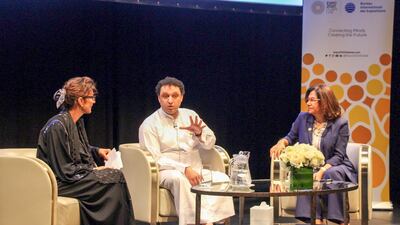The first Emirati opera will be launched at Dubai Expo 2020 and followed by a legacy tour to leading cities around the world.
Al Wasl will be a multilingual opera that tells the history of the emirate, spanning 4,000 years from the Umm Al Nar period.
The opera will feature global artists and musicians, who will perform to a score by Emirati composer Mohammed Fairouz and lyrics by author and librettist Maha Gargash.
“The reason we’ve chosen opera is because this art form embodies various artistic expressions,” said Hayat Shamsuddin, the vice president of Arts and Culture at Expo 2020. “We hear music, we watch a performance, we follow the story and the whole performance engages all our sense experientially.”
The two-hour production is being created in partnership with Welsh National Opera and will premiere in October next year at Dubai Opera, aligning with the official opening of Expo 2020.
Performed in both Arabic and English, it will feature a cast of at least 100 artists and musicians as well as a production team of 70 professionals.
In addition to the performance, organisers have developed educational and outreach initiatives including music master classes, performance opportunities, casting opportunities and courses in costume design and theatrical makeup.
Mr Fairouz and Ms Gargash began work on the opera three years ago when the composer contacted her to develop a short story he had written.
He was a fan of her novels but the proposal left Ms Gargash in disbelief. “I didn’t really allow myself to get too excited because I didn’t know whether I could do it,” she said.
But Mr Fairouz was confident.
“What exactly is a novelist other than a writer of long stories?” he asked.
The tale begins at Saruq Al Hadid, a trade and metallurgy centre that flourished during the Iron Age in what would become Dubai. The opera jumps to Dubai Airport in the modern metropolis for its second act before concluding in the not-so-distant future.
Mr Fairouz flew back and forth to Dubai from his home in New York while Ms Gargash wrote the lyrics between September and January.
The pair were given “complete independence” to create without censor or constraint.
To Ms Gargash’s surprise, she wrote it in five months. “You know it was a very happy experience,” she said. “Everything just fell into place very nicely.”
The score will be finished within eight months, at which point casting and set design will be under way.
Audiences should expect the unusual from Mr Fairouz. His 2017 sci-fi opera The New Prince is about the time travels of the medieval philosopher Niccolò Machiavelli and includes the real life characters of Henry Kissinger, Osama bin Laden, Hilary Clinton, Mohammed Morsi, Adolf Hitler and Chairman Mao.
Al Wasl will break from operatic tradition in its incorporation of multiple languages, like Russian, Malayalam and Mandarine, for cacophony that is distinctly Gulf.
“It’s very important that when you write something, it should be a reflection of the world you live in,” said Mr Fairouz. “It’s what we hear when we go into a taxi here, we hear Urdu and Hindi music, we hear different types of Arabic. It’s easier to hear the world in one sound. It’s more realistic to hear the world in many sounds.”
Al Wasl is an old name for Dubai but Mr Fairouz is keen to avoid rehashing national narratives.
"This is an absolutely new story. There's been a number of stories told about the Arabian Peninsula. One of the emblematic ones that I like to refer to is this story that was told in a book by Jim Krane called City of Gold. In this book he says history happened elsewhere, that none of the movements of science and culture that moved the world happened in the Arabian Peninsula.
“Well, I think this this story is really going to show and demonstrate that’s a wrong perspective and that’s an uninteresting perspective.”
The result will be an opera for the masses.
“Anybody who thinks that singing and telling stories is elite comes from a different planet than the one we’ve been living on,” said Mr Fairouz. “The elitism of art is a myth spread by people who think they know more than they do.”

